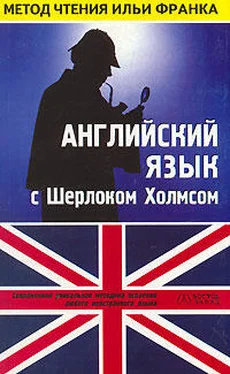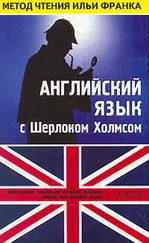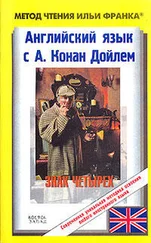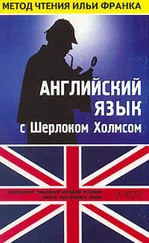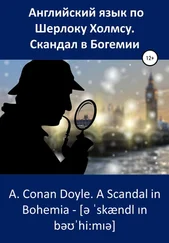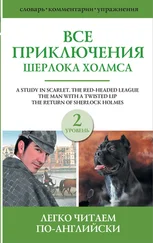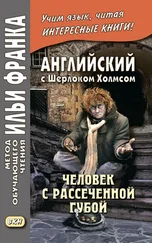savagely ['s&vIdZlI], discovered [dIs'kVv@d], strewn [stru:n], criminal ['krImIn(@)l], lunatic ['lu:n@tIk], mischief ['mIstSIf]
“Well, when Dr. Barnicot came down this morning he was astonished to find that his house had been burgled during the night, but that nothing had been taken save the plaster head from the hall. It had been carried out and had been dashed savagely against the garden wall, under which its splintered fragments were discovered.”
Holmes rubbed his hands.
“This is certainly very novel,” said he.
“I thought it would please you. But I have not got to the end yet. Dr. Barnicot was due at his surgery at twelve o’clock, and you can imagine his amazement when, on arriving there, he found that the window had been opened in the night and that the broken pieces of his second bust were strewn all over the room. It had been smashed to atoms where it stood. In neither case were there any signs which could give us a clue as to the criminal or lunatic who had done the mischief. Now, Mr. Holmes, you have got the facts.”
“They are singular (они необычны) , not to say grotesque (чтобы не сказать причудливы; grotesque — гротескный; абсурдный, причудливый) ,” said Holmes. “May I ask whether the two busts smashed in Dr. Barnicot’s rooms (можно спросить = хотелось бы знать, являлись ли два бюста, разбитые в комнатах доктора Барникота; whether — ли /вводит косвенный вопрос/) were the exact duplicates of the one (точными копиями того бюста; one — слово-заместитель /во избежание повторения ранее упомянутого существительного/) which was destroyed in Morse Hudson’s shop (который был разбит в лавке Морза Хадсона) ?”
“They were taken from the same mould (их отливали в одной и той же форме; to take-took-taken; mould — шаблон, образец; литейная форма; to mould — отливать форму, формовать) .”
“Such a fact must tell against the theory (такой факт должен опровергать версию; to tell against — свидетельствовать против; говорить не в пользу кого-либо/чего-либо; theory — теория; предположение, версия) that the man who breaks them (что человек, который разбивает их) is influenced by any general hatred of Napoleon (действует под влиянием некоей всеобъемлющей ненависти к Наполеону; general — /все/общий, обычный; полный; influence — влияние, /воз/действие) . Considering how many hundreds of statues of the great Emperor must exist in London (учитывая, сколько: «как много» сотен изваяний великого императора находится в Лондоне; to consider — рассматривать; принимать во внимание, учитывать; to exist — существовать; быть, иметь место) , it is too much to suppose such a coincidence (трудно допустить подобное случайное стечение обстоятельств; too much — чересчур, слишком; coincidence — совпадение; случайное стечение обстоятельств) as that a promiscuous iconoclast should chance to begin upon three specimens of the same bust (что неразборчивый «иконоборец» случайно начал с трех экземпляров одного и того же бюста; promiscuous — беспорядочный, неразборчивый /в знакомствах, связях и т. п./; iconoclast — иконоборец; chance — шанс, вероятность; случай/ность/; to chance — случаться; решиться /на что-либо/, рискнуть) .”
grotesque [gr@u'tesk], theory ['TI@rI], exist [Ig'zIst], coincidence [k@u'InsId(@)ns], promiscuous [pr@'mIskju@s], iconoclast [aI'kOn@kl&st], specimen ['spesIm@n]
“They are singular, not to say grotesque,” said Holmes. “May I ask whether the two busts smashed in Dr. Barnicot’s rooms were the exact duplicates of the one which was destroyed in Morse Hudson’s shop?”
“They were taken from the same mould.”
“Such a fact must tell against the theory that the man who breaks them is influenced by any general hatred of Napoleon. Considering how many hundreds of statues of the great Emperor must exist in London, it is too much to suppose such a coincidence as that a promiscuous iconoclast should chance to begin upon three specimens of the same bust.”
“Well, I thought as you do (что ж, я думал так же, как и вы) ,” said Lestrade. “On the other hand (с другой стороны) , this Morse Hudson is the purveyor of busts in that part of London (Морз Хадсон — поставщик бюстов в этой части Лондона) , and these three were the only ones (а эти три были единственными /бюстами/) which had been in his shop for years (что находились в его лавке в течение /многих/ лет) . So, although, as you say (поэтому, хотя, как вы говорите) , there are many hundreds of statues in London (в Лондоне много сотен = огромное число изваяний) , it is very probable (очень вероятно) that these three were the only ones in that district (что эти три были единственными в том районе; district — район; округ; местность) . Therefore, a local fanatic would begin with them (поэтому местный фанатик начал с них; therefore — по этой причине; следовательно, поэтому) . What do you think, Dr. Watson (что вы /об этом/ думаете, доктор Ватсон) ?”
“There are no limits to the possibilities of monomania (не существует пределов вероятностям мономании; limits — границы; рамки; пределы; monomania — мономания /болезненное состояние, проявляющееся в аномальной концентрации внимания на одной какой-либо мысли, идее/) ,” I answered (ответил я) . “There is the condition (существует такое состояние; condition — условие; состояние; нарушение, расстройство, болезненное состояние) which the modern French psychologists have called the ‘Idée fixe (которое современные французские психологи назвали «навязчивая идея») ,’ which may be trifling in character (которая может быть по сути пустячной; trifle — мелочь, пустяк; character — характер, нрав; личность; характерная черта; признак; особенность) , and accompanied by complete sanity in every other way (и сопровождаться полной вменяемостью во всех других отношениях; sanity — нормальная психика; здравый ум, рассудок; sane — здравый, находящийся в здравом уме; way — путь; способ, образ действия; отношение, аспект) . A man who had read deeply about Napoleon (у человека, который много читал о Наполеоне; to read [ri:d]-read [red]-read [red]; deeply — глубоко; серьезно) , or who had possibly received some hereditary family injury through the great war (или /который/, возможно, получил наследственное семейное оскорбление, нанесенное = узнал о какой-нибудь обиде, нанесенной его предкам во время наполеоновских войн: «великой войны»; to receive — получать; подвергаться; hereditary — наследственный, передаваемый по наследству; family — семья, род; семейный, фамильный; injury — вред, рана; оскорбление, обида) , might conceivably form such an idée fixe (возможно, могла сформироваться такая «навязчивая идея»; to form — принимать или придавать форму; приобретать) and under its influence be capable of any fantastic outrage (и под ее влиянием он способен на любые фантастические/причудливые выходки; outrage — грубое нарушение /закона, прав, приличий/; произвол; бесчинство) .”
Читать дальше
